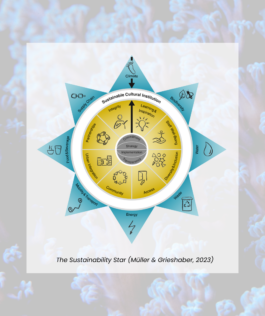


Evidence from the pilot study.
Arts and cultural institutions face increasing expectations from governments, funders, and the public to adopt sustainable practices. However, efforts to address sustainability often remain fragmented due to a lack of sector-specific standards, tools, and frameworks.
The Culture for the Planet pilot research led by Professor Martin Müller and researcher Julie Grieshaber from the University of Lausanne (UNIL), involved approximately twenty in-depth interviews and a global survey with responses from over 200 international institutions. This research provided an overview of the transition towards sustainability within arts and cultural organisations.
Why this matters.
The interest in this project stems from the recognition that arts and culture play a unique role in successful socio-ecological regeneration. The pilot research revealed that these institutions are well-positioned to lead the sustainability transition . With strong public trust, high visitor numbers, and significant capacity for inspiration, they can act as thought leaders and models for other sectors.

Key findings.
The research also highlighted the need for a more coordinated approach within the sector. Many institutions are beginning to take steps toward sustainability, but often in isolation, without integrating sustainability into their overall strategy. Additionally, challenges like insufficient expertise, limited funding, and the absence of clear benchmarks hinder progress, creating gaps between ambition and implementation.
There is currently no shared understanding of what it means to « become sustainable » among arts and cultural organisations. The sector must adopt a holistic approach to sustainability that goes beyond just climate, energy, and waste. With the right sector-specific tools, organisations can effectively report and monitor their progress, while identifying potential gaps and areas for improvement in a cohesive and structured way.
To address these gaps, the pilot research developed a conceptual model for sustainability in arts and culture: The Sustainability Star. This model serves as the foundation for future research, identifying key leverage points for arts and cultural institution's sustainability through a holistic, strategic approach.
Conclusion and next step.
Arts and culture have the ability to challenge the status quo and drive meaningful change. To harness the sector's full potential, the research identified three key directions for improvement and action:
You can read more about the Culture for the Planet pilot study results under the links below:
Make a unified commitment to a sustainability agenda to break down existing silos.
Craving more data on sustainability drivers and barriers?
Dive into the interactive results
Interested in the state of sustainability in the art and cultural sector?
Explore the academic article:
« How sustainable are cultural organizations? A global benchmark »
The Culture Goes Sustainable research-for-action project, co-created by Professor Martin Müller (UNIL) and Professor Leticia Labaronne (ZHAW), was awarded a four-year Swiss BRIDGE Discovery Grant for its potential to drive societal transformation.
Research leads the way towards innovation.
Supported by the Swiss BRIDGE Grant.
Considering the results from the pilot study, the Culture Goes Sustainable research-for-action project was co-created by Professor Martin Müller from the University of Lausanne (UNIL), Department of Geography and Sustainability, and Professor Leticia Labaronne from the Zurich University of Applied Sciences (ZHAW), Center for Arts Management. The project was awarded a four-year funding as a Swiss BRIDGE Discovery Grant due to its potential for societal transformation.
BRIDGE is a funding programme by the Swiss National Science Foundation (SNSF) and Innosuisse. This elite and select programme supports projects whose results have potential for an innovative product or service. In this way, they accelerate the transfer of research results into the economy and society.
You can find out more on the BRIDGE grant at the link:


Evidence from the pilot study.
Arts and cultural institutions face increasing expectations from governments, funders, and the public to adopt sustainable practices. However, efforts to address sustainability often remain fragmented due to a lack of sector-specific standards, tools, and frameworks.
The Culture for the Planet pilot research led by Professor Martin Müller and researcher Julie Grieshaber from the University of Lausanne (UNIL), involved approximately twenty in-depth interviews and a global survey with responses from over 200 international institutions. This research provided an overview of the transition towards sustainability within arts and cultural organisations.
Why this matters.
The interest in this project stems from the recognition that arts and culture play a unique role in successful socio-ecological regeneration. The pilot research revealed that these institutions are well-positioned to lead the sustainability transition . With strong public trust, high visitor numbers, and significant capacity for inspiration, they can act as thought leaders and models for other sectors.
Key findings.
The research also highlighted the need for a more coordinated approach within the sector. Many institutions are beginning to take steps toward sustainability, but often in isolation, without integrating sustainability into their overall strategy. Additionally, challenges like insufficient expertise, limited funding, and the absence of clear benchmarks hinder progress, creating gaps between ambition and implementation.
There is currently no shared understanding of what it means to « become sustainable » among arts and cultural organisations. The sector must adopt a holistic approach to sustainability that goes beyond just climate, energy, and waste. With the right sector-specific tools, organisations can effectively report and monitor their progress, while identifying potential gaps and areas for improvement in a cohesive and structured way.
To address these gaps, the pilot research developed a conceptual model for sustainability in arts and culture: The Sustainability Star. This model serves as the foundation for future research, identifying key leverage points for arts and cultural institution's sustainability through a holistic, strategic approach.
Conclusion and next step.
Arts and culture have the ability to challenge the status quo and drive meaningful change. To harness the sector's full potential, the research identified three key directions for improvement and action:
You can read more about the Culture for the Planet pilot study results under the links below:
Make a unified commitment to a sustainability agenda to break down existing silos.
Craving more data on sustainability drivers and barriers?
Dive into the interactive results
Interested in the state of sustainability in the art and cultural sector?
Explore the academic article:
« How sustainable are cultural organizations? A global benchmark »
The Culture Goes Sustainable research-for-action project, co-created by Professor Martin Müller (UNIL) and Professor Leticia Labaronne (ZHAW), was awarded a four-year Swiss BRIDGE Discovery Grant for its potential to drive societal transformation.
Research leads the way towards innovation.
Supported by the Swiss BRIDGE Grant.
Considering the results from the pilot study, the Culture Goes Sustainable research-for-action project was co-created by Professor Martin Müller from the University of Lausanne (UNIL), Department of Geography and Sustainability, and Professor Leticia Labaronne from the Zurich University of Applied Sciences (ZHAW), Center for Arts Management. The project was awarded a four-year funding as a Swiss BRIDGE Discovery Grant due to its potential for societal transformation.
BRIDGE is a funding programme by the Swiss National Science Foundation (SNSF) and Innosuisse. This elite and select programme supports projects whose results have potential for an innovative product or service. In this way, they accelerate the transfer of research results into the economy and society.
You can find out more on the BRIDGE grant at the link:

